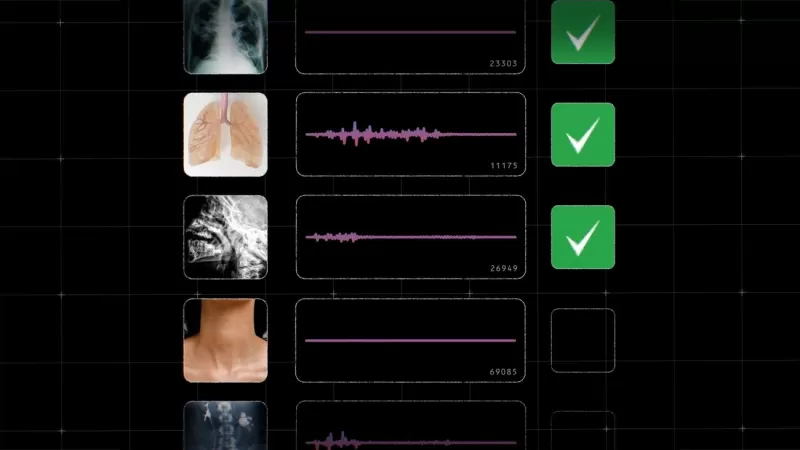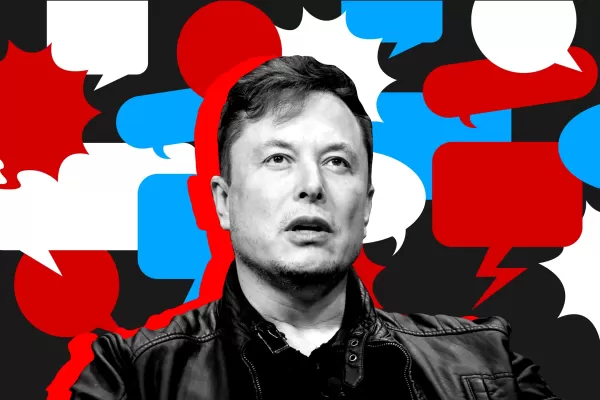AI Model Aids in Disease Detection Through Cough Analysis

From the sound of a cough to the rhythm of our breath, the noises our bodies produce are packed with health-related info. These subtle bioacoustic signals could totally change the game in screening, diagnosing, monitoring, and managing various health issues, like tuberculosis (TB) or chronic obstructive pulmonary disease (COPD). At Google, we see the huge potential in using sound as a health indicator, especially since smartphone mics are so common. That's why we've been diving into how AI can pull health insights from these sounds.
Earlier this year, we rolled out Health Acoustic Representations, or HeAR, a bioacoustic foundation model that helps researchers create models capable of listening to human sounds and spotting early disease signs. The Google Research team trained HeAR on a whopping 300 million audio clips from a diverse, de-identified dataset. For the cough model specifically, we used around 100 million cough sounds.
HeAR is designed to pick up on patterns in health-related sounds, laying a solid groundwork for medical audio analysis. We've found that, on average, HeAR outperforms other models across a bunch of tasks and is great at working with different microphones, showing its knack for capturing meaningful health-related sound patterns. Plus, models built with HeAR can achieve high performance even with less training data, which is a big deal in the data-limited world of healthcare research.
Now, HeAR is available for researchers to speed up the development of custom bioacoustic models, even when data, setup, or computing power is limited. Our aim is to boost research into models for specific conditions and groups, no matter how sparse the data or how high the costs.
Salcit Technologies, a respiratory health company based in India, has developed Swaasa®, an AI-powered tool that analyzes cough sounds to assess lung health. They're now looking into how HeAR can boost their bioacoustic AI models. Swaasa® is starting by using HeAR to improve their early detection of TB through cough sounds.
TB is treatable, but millions of cases go undiagnosed each year, often because people can't easily access healthcare. Better diagnosis is key to wiping out TB, and AI can make a big difference in detection and making care more accessible and affordable worldwide. Swaasa® has been using machine learning to catch diseases early, making health assessments more accessible, affordable, and scalable without needing special equipment or a specific location. With HeAR, they're looking to expand TB screening across India.
"Every missed TB case is a tragedy; every late diagnosis, a heartbreak," says Sujay Kakarmath, a product manager at Google Research working on HeAR. "Acoustic biomarkers could change this story. I'm really thankful for the part HeAR can play in this journey."
We're also getting support from groups like The StopTB Partnership, a UN-hosted organization that connects TB experts and affected communities to end TB by 2030.
"Tools like HeAR can push forward AI-powered acoustic analysis in TB screening and detection, offering a low-impact, accessible solution to those who need it most," said Zhi Zhen Qin, a digital health specialist with the Stop TB Partnership.
HeAR is a big leap forward in acoustic health research. We're hoping to help develop future diagnostic tools and monitoring solutions for TB, chest, lung, and other diseases, and improve health outcomes for communities everywhere through our research. If you're a researcher interested in HeAR, you can find out more and request access to the HeAR API.
Related article
 YouTube Integrates Veo 3 AI Video Tool Directly Into Shorts Platform
YouTube Shorts to Feature Veo 3 AI Video Model This SummerYouTube CEO Neal Mohan revealed during his Cannes Lions keynote that the platform's cutting-edge Veo 3 AI video generation technology will debut on YouTube Shorts later this summer. This follo
YouTube Integrates Veo 3 AI Video Tool Directly Into Shorts Platform
YouTube Shorts to Feature Veo 3 AI Video Model This SummerYouTube CEO Neal Mohan revealed during his Cannes Lions keynote that the platform's cutting-edge Veo 3 AI video generation technology will debut on YouTube Shorts later this summer. This follo
 Google Cloud Powers Breakthroughs in Scientific Research and Discovery
The digital revolution is transforming scientific methodologies through unprecedented computational capabilities. Cutting-edge technologies now augment both theoretical frameworks and laboratory experiments, propelling breakthroughs across discipline
Google Cloud Powers Breakthroughs in Scientific Research and Discovery
The digital revolution is transforming scientific methodologies through unprecedented computational capabilities. Cutting-edge technologies now augment both theoretical frameworks and laboratory experiments, propelling breakthroughs across discipline
 Elon Musk's Grok AI Seeks Owner's Input Before Tackling Complex Queries
The recently released Grok AI—promoted by Elon Musk as a "maximally truth-seeking" system—has drawn attention for its tendency to consult Musk's public statements before responding to politically sensitive topics. Observers note that when addressing
Comments (24)
0/200
Elon Musk's Grok AI Seeks Owner's Input Before Tackling Complex Queries
The recently released Grok AI—promoted by Elon Musk as a "maximally truth-seeking" system—has drawn attention for its tendency to consult Musk's public statements before responding to politically sensitive topics. Observers note that when addressing
Comments (24)
0/200
![JoseJackson]() JoseJackson
JoseJackson
 August 24, 2025 at 9:01:19 AM EDT
August 24, 2025 at 9:01:19 AM EDT
This AI cough analysis sounds wild! 😮 Imagine just coughing into your phone and boom, it tells you if something’s up. Super cool, but I wonder how accurate it is for stuff like TB. Anyone tried this yet?


 0
0
![StephenPerez]() StephenPerez
StephenPerez
 August 19, 2025 at 9:01:15 PM EDT
August 19, 2025 at 9:01:15 PM EDT
This AI cough analysis sounds wild! 😮 Imagine diagnosing TB just from a cough—game-changer for sure, but I wonder how accurate it is in noisy places like cities?


 0
0
![GraceWright]() GraceWright
GraceWright
 August 14, 2025 at 3:01:00 PM EDT
August 14, 2025 at 3:01:00 PM EDT
This AI cough analysis sounds wild! 😮 Imagine just coughing into your phone and boom, it tells you if you’ve got TB or something. Super cool, but I hope it doesn’t mishear my morning coffee choke as a disease!


 0
0
![HaroldMiller]() HaroldMiller
HaroldMiller
 August 1, 2025 at 9:47:34 AM EDT
August 1, 2025 at 9:47:34 AM EDT
This AI cough analysis sounds wild! 🤯 Imagine diagnosing TB just from a cough—game-changer for sure, but I wonder how accurate it is in noisy places like cities.


 0
0
![LawrenceWilliams]() LawrenceWilliams
LawrenceWilliams
 April 21, 2025 at 12:21:53 PM EDT
April 21, 2025 at 12:21:53 PM EDT
This AI tool that detects diseases from coughs is pretty cool! It's like having a mini doctor in your pocket. I tried it when I had a cold and it was spot on. Only thing is, it can be a bit sensitive to background noise, but overall, it's a lifesaver! 😷👍


 0
0
![JustinAnderson]() JustinAnderson
JustinAnderson
 April 19, 2025 at 9:45:04 PM EDT
April 19, 2025 at 9:45:04 PM EDT
¡Qué herramienta tan genial para detectar enfermedades solo con analizar la tos! Es como magia, pero ojalá pudiera decirme más sobre lo que realmente me pasa. Aún así, es útil para hacer chequeos de salud rápidos en casa. ¿Quizás en el futuro puedan agregar diagnósticos más detallados? 🤔


 0
0

From the sound of a cough to the rhythm of our breath, the noises our bodies produce are packed with health-related info. These subtle bioacoustic signals could totally change the game in screening, diagnosing, monitoring, and managing various health issues, like tuberculosis (TB) or chronic obstructive pulmonary disease (COPD). At Google, we see the huge potential in using sound as a health indicator, especially since smartphone mics are so common. That's why we've been diving into how AI can pull health insights from these sounds.
Earlier this year, we rolled out Health Acoustic Representations, or HeAR, a bioacoustic foundation model that helps researchers create models capable of listening to human sounds and spotting early disease signs. The Google Research team trained HeAR on a whopping 300 million audio clips from a diverse, de-identified dataset. For the cough model specifically, we used around 100 million cough sounds.
HeAR is designed to pick up on patterns in health-related sounds, laying a solid groundwork for medical audio analysis. We've found that, on average, HeAR outperforms other models across a bunch of tasks and is great at working with different microphones, showing its knack for capturing meaningful health-related sound patterns. Plus, models built with HeAR can achieve high performance even with less training data, which is a big deal in the data-limited world of healthcare research.
Now, HeAR is available for researchers to speed up the development of custom bioacoustic models, even when data, setup, or computing power is limited. Our aim is to boost research into models for specific conditions and groups, no matter how sparse the data or how high the costs.
Salcit Technologies, a respiratory health company based in India, has developed Swaasa®, an AI-powered tool that analyzes cough sounds to assess lung health. They're now looking into how HeAR can boost their bioacoustic AI models. Swaasa® is starting by using HeAR to improve their early detection of TB through cough sounds.
TB is treatable, but millions of cases go undiagnosed each year, often because people can't easily access healthcare. Better diagnosis is key to wiping out TB, and AI can make a big difference in detection and making care more accessible and affordable worldwide. Swaasa® has been using machine learning to catch diseases early, making health assessments more accessible, affordable, and scalable without needing special equipment or a specific location. With HeAR, they're looking to expand TB screening across India.
"Every missed TB case is a tragedy; every late diagnosis, a heartbreak," says Sujay Kakarmath, a product manager at Google Research working on HeAR. "Acoustic biomarkers could change this story. I'm really thankful for the part HeAR can play in this journey."
We're also getting support from groups like The StopTB Partnership, a UN-hosted organization that connects TB experts and affected communities to end TB by 2030.
"Tools like HeAR can push forward AI-powered acoustic analysis in TB screening and detection, offering a low-impact, accessible solution to those who need it most," said Zhi Zhen Qin, a digital health specialist with the Stop TB Partnership.
HeAR is a big leap forward in acoustic health research. We're hoping to help develop future diagnostic tools and monitoring solutions for TB, chest, lung, and other diseases, and improve health outcomes for communities everywhere through our research. If you're a researcher interested in HeAR, you can find out more and request access to the HeAR API.
 YouTube Integrates Veo 3 AI Video Tool Directly Into Shorts Platform
YouTube Shorts to Feature Veo 3 AI Video Model This SummerYouTube CEO Neal Mohan revealed during his Cannes Lions keynote that the platform's cutting-edge Veo 3 AI video generation technology will debut on YouTube Shorts later this summer. This follo
YouTube Integrates Veo 3 AI Video Tool Directly Into Shorts Platform
YouTube Shorts to Feature Veo 3 AI Video Model This SummerYouTube CEO Neal Mohan revealed during his Cannes Lions keynote that the platform's cutting-edge Veo 3 AI video generation technology will debut on YouTube Shorts later this summer. This follo
 Google Cloud Powers Breakthroughs in Scientific Research and Discovery
The digital revolution is transforming scientific methodologies through unprecedented computational capabilities. Cutting-edge technologies now augment both theoretical frameworks and laboratory experiments, propelling breakthroughs across discipline
Google Cloud Powers Breakthroughs in Scientific Research and Discovery
The digital revolution is transforming scientific methodologies through unprecedented computational capabilities. Cutting-edge technologies now augment both theoretical frameworks and laboratory experiments, propelling breakthroughs across discipline
 Elon Musk's Grok AI Seeks Owner's Input Before Tackling Complex Queries
The recently released Grok AI—promoted by Elon Musk as a "maximally truth-seeking" system—has drawn attention for its tendency to consult Musk's public statements before responding to politically sensitive topics. Observers note that when addressing
Elon Musk's Grok AI Seeks Owner's Input Before Tackling Complex Queries
The recently released Grok AI—promoted by Elon Musk as a "maximally truth-seeking" system—has drawn attention for its tendency to consult Musk's public statements before responding to politically sensitive topics. Observers note that when addressing
 August 24, 2025 at 9:01:19 AM EDT
August 24, 2025 at 9:01:19 AM EDT
This AI cough analysis sounds wild! 😮 Imagine just coughing into your phone and boom, it tells you if something’s up. Super cool, but I wonder how accurate it is for stuff like TB. Anyone tried this yet?


 0
0
 August 19, 2025 at 9:01:15 PM EDT
August 19, 2025 at 9:01:15 PM EDT
This AI cough analysis sounds wild! 😮 Imagine diagnosing TB just from a cough—game-changer for sure, but I wonder how accurate it is in noisy places like cities?


 0
0
 August 14, 2025 at 3:01:00 PM EDT
August 14, 2025 at 3:01:00 PM EDT
This AI cough analysis sounds wild! 😮 Imagine just coughing into your phone and boom, it tells you if you’ve got TB or something. Super cool, but I hope it doesn’t mishear my morning coffee choke as a disease!


 0
0
 August 1, 2025 at 9:47:34 AM EDT
August 1, 2025 at 9:47:34 AM EDT
This AI cough analysis sounds wild! 🤯 Imagine diagnosing TB just from a cough—game-changer for sure, but I wonder how accurate it is in noisy places like cities.


 0
0
 April 21, 2025 at 12:21:53 PM EDT
April 21, 2025 at 12:21:53 PM EDT
This AI tool that detects diseases from coughs is pretty cool! It's like having a mini doctor in your pocket. I tried it when I had a cold and it was spot on. Only thing is, it can be a bit sensitive to background noise, but overall, it's a lifesaver! 😷👍


 0
0
 April 19, 2025 at 9:45:04 PM EDT
April 19, 2025 at 9:45:04 PM EDT
¡Qué herramienta tan genial para detectar enfermedades solo con analizar la tos! Es como magia, pero ojalá pudiera decirme más sobre lo que realmente me pasa. Aún así, es útil para hacer chequeos de salud rápidos en casa. ¿Quizás en el futuro puedan agregar diagnósticos más detallados? 🤔


 0
0





























